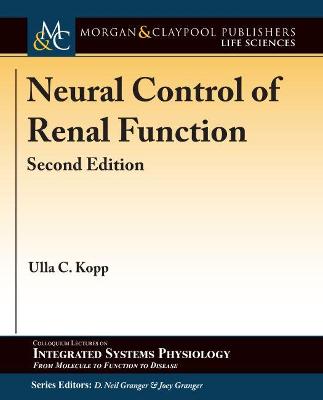The kidney is innervated with efferent sympathetic nerve fibers reaching the renal vasculature, the tubules, the juxtaglomerular granular cells, and the renal pelvic wall. The renal sensory nerves are mainly found in the renal pelvic wall. Increases in efferent renal sympathetic nerve activity reduce renal blood flow and urinary sodium excretion by activation of α1-adrenoceptors and increase renin secretion rate by activation of β1-adrenoceptors. In response to normal physiological stimulation, changes in efferent renal sympathetic nerve activity contribute importantly to homeostatic regulation of sodium and water balance. The renal mechanosensory nerves are activated by stretch of the renal pelvic tissue produced by increases in renal pelvic tissue of a magnitude that may occur during increased urine flow rate. Under normal conditions, the renal mechanosensory nerves activated by stretch of the sensory nerves elicits an inhibitory renorenal reflex response consisting of decreases in efferent renal sympathetic nerve activity leading to natriuresis. Increasing efferent sympathetic nerve activity increases afferent renal nerve activity which, in turn, decreases efferent renal sympathetic nerve activity by activation of the renorenal reflexes. Thus, activation of the afferent renal nerves buffers changes in efferent renal sympathetic nerve activity in the overall goal of maintaining sodium balance. In pathological conditions of sodium retention, impairment of the inhibitory renorenal reflexes contributes to an inappropriately increased efferent renal sympathetic nerve activity in the presence of sodium retention. In states of renal disease or injury, there is a shift from inhibitory to excitatory reflexes originating in the kidney. Studies in essential hypertensive patients have shown that renal denervation results in long-term reduction in arterial pressure, suggesting an important role for the efferent and afferent renal nerves in hypertension.
- ISBN13 9781615047758
- Publish Date 17 July 2018
- Publish Status Active
- Publish Country US
- Imprint Morgan & Claypool Publishers
- Edition 2nd Revised edition
- Format Paperback
- Pages 106
- Language English
